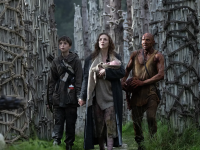
As a member of the Brahmin caste, Srinivasa Ramanujan was forbidden to cross the ocean. However, this precocious, young mathematical genius from Madras had no choice but to travel to England to pursue his work and fulfil his destiny.
The Man Who Knew Infinity is based on the 1991 book of the same name by Robert Kanigel. Kanigel’s book is a detailed biography of Indian mathematician Srinivasa Ramanujan who has come to be regarded as one of the most influential pure mathematicians in history. Long after his death, many of his theories are stimulating new research and finding applications in a variety of scientific fields. This film focuses on Ramanujan’s collaboration with Cambridge University mathematics professor G. H. Hardy around the time of the 1st World War.
Set in Madras, the film opens with Ramanujan (Dev Patel) living rough with his brother. He spends his time chalking complex equations and theorems on the stone floor of a temple; paper is expensive and hard to come by. He is desperate for employment so that he can get a proper place to live for himself and his wife Janaki (Devika Bhise). He soon finds work as an accounts clerk under the disapproving patronage of Sir Francis Spring (Stephen Fry). Here he finds an ally who helps him to find contacts in England in return for tutoring in Ramanujan’s work. Janaki has now joined him in their modest new home, but his mother is not supportive of this marriage. Ramanujan receives a letter from G. H. Hardy (Jeremy Irons) inviting him to Trinity College Cambridge. After deep soul searching and the blessing of his wife he decides to go.
 Some of Ramanujan’s mathematical theories and equations are likely to be beyond the understanding of a mainstream audience, so it must have been a difficult decision as to what to include in the film. I understood the bit about ‘partitions’, but most of the rest of the terms went over my head. If you are looking for a detailed outline of Ramanujan’s major work, I would suggest that you try the book. However, I think they got the balance in the film just right. Mathematics in this film serves primarily as the all-consuming passion and obsession that brings these two men together. What we then have is a beautifully observed account of this unlikely partnership and ultimately, their friendship.
Some of Ramanujan’s mathematical theories and equations are likely to be beyond the understanding of a mainstream audience, so it must have been a difficult decision as to what to include in the film. I understood the bit about ‘partitions’, but most of the rest of the terms went over my head. If you are looking for a detailed outline of Ramanujan’s major work, I would suggest that you try the book. However, I think they got the balance in the film just right. Mathematics in this film serves primarily as the all-consuming passion and obsession that brings these two men together. What we then have is a beautifully observed account of this unlikely partnership and ultimately, their friendship.
The supporting characters in this film are just that. Back home we have the devoted wife and the disapproving mother. On campus we have any number of university dons and college fellows who believe Ramanujan to be an ill-bred charlatan. But we also have Hardy’s closest associate John Littlewood (Toby Jones).
When Ramanujan first arrives at Cambridge, Littlewood is the amiable ‘Dr Watson’ to Hardy’s elusive ‘Holmes’, and is an essential mediator between the two. As well being a skilled mathematician and good friend to Hardy, Littlewood seems to be just about the only nice person there. In the hands of the excellent Toby Jones this small role becomes indispensable to the success of the film. Trinity College would have been a cold and unwelcoming place without him.
 This film has been in development for a number of years, and Dev Patel was not the original choice to play Ramanujan. The role was cast originally back in 2012 for Tamil actor Ranganathan Madhavan. However, the producers later wanted an actor with an international reputation. Dev Patel portrays Ramanujan as a passionate and driven man whose lack of time for the naysayers made him appear arrogant. This plays to Dev Patel’s undoubted strengths as an actor. He lights up a room and illuminates a scene. However, I could also have written this same description of Patel’s portrayal of Sonny Kapoor in the Best Exotic Marigold Hotel movies. From now on I do hope he gets the opportunity to take on roles that test his acting range.
This film has been in development for a number of years, and Dev Patel was not the original choice to play Ramanujan. The role was cast originally back in 2012 for Tamil actor Ranganathan Madhavan. However, the producers later wanted an actor with an international reputation. Dev Patel portrays Ramanujan as a passionate and driven man whose lack of time for the naysayers made him appear arrogant. This plays to Dev Patel’s undoubted strengths as an actor. He lights up a room and illuminates a scene. However, I could also have written this same description of Patel’s portrayal of Sonny Kapoor in the Best Exotic Marigold Hotel movies. From now on I do hope he gets the opportunity to take on roles that test his acting range.
Looking back over Jeremy Irons’ career, I’m trying to gauge where this performance sits in his list of achievements. I remember clearly watching him at the cinema in his Oscar winning role as Claus von Bulow in 1990’s Reversal of Fortune. He had already become a household name half his lifetime ago in The French Lieutenant’s Woman and Brideshead Revisited. However, here I think he gives the film performance of his career as the introverted intellectual who is forced to ‘feel’ friendship and question his own long-held religious beliefs.
By and large, cinema audiences have enjoyed this film more than the movie critics. Unlike Ramanujan’s mathematical theories, this film will not change the world. It is not edgy, ground- breaking and will not redefine the landscape of modern cinema. But I’m with the audience on this one. OK, so the wartime hospital was a bit too clean and the ship that transported Ramanujan to England in 1914 looked like an Airfix model, but this is a wonderful film.
Matt Brown skilfully directs his own screenplay, the highlight being all the scenes which involve Jeremy Irons and Dev Patel together. Their scenes are the primary focus of the film, making this story particularly suited to a theatre adaptation.
This is a truly inspiring story of a young man who, despite crippling illness and racial abuse, is given his true voice by a mentor who recognized his genius.

Author – Simon, Norwich store





